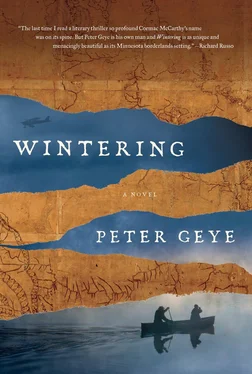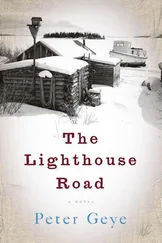This was the popular version of their story, the one whispered over drinks at the Traveler’s Hotel saloon, coffee in the church basement, and fishing bobbers up on Long Finger Lake. The one I overheard in pieces over the apothecary’s counter. But you never would have heard it from Rebekah or Odd or Harry. For them, the story of their blood was sacrosanct. People avoided the subject with them as though it were poisonous. Children were born into old families up here knowing to give it a wide berth.
So it came as a surprise to me when, some months after Harry and I took up, he mentioned his mother.
“It’s a pity and a sad thing to see that woman— Miss Grimm —tucked away up there in that rest home. No one to bring her flowers.”
“I bring her flowers,” I told him. “I did just yesterday.”
He seemed insulted. “You don’t work for her anymore.”
“You think I don’t know that?”
“So you don’t have to go see her anymore,” he said.
“Are you saying you don’t want me to?”
“I’m saying you’ve done your service. Her friends can keep her company now.”
I remember wondering if we were arguing. What I said was “I’m her friend. Her only friend.”
“You’re not her friend.”
“Of course I am.”
“Well, far be it from me to say who your friends are,” he said. “Just know she won’t be a regular topic of conversation, eh?”
But as I said, he brought her up often. Never “How’s my mother?” or “Will you say hello for me?” or “Do you think I ought to pay her a visit?” What he did say was cutting or worse. “I suppose Miss Grimm’s ranting hardly registers with the rest of the seniles up there at the home,” or “I bet there’s no one left to empty Miss Grimm’s bedpan up there, eh?” or “I bet they’ve replaced the goose down in her pillow with porcupine quills by now.”
His barbs were so entirely out of character that at moments I felt that I was talking with another man altogether. That the kind and gentle and lonely man I already loved was someone I’d invented to salve my own loneliness, which in fact had been increased by his mother’s absence from my everyday life.
At night, in the new house Harry had built for me, pacing around, trying to get used to the quiet thrill of it all, I began thinking of how I might tell him about her. Things I’d come to know during the many years I lived with her. My first nights in the apothecary were terrifying. I was only seventeen years old and living with a phantom. I knew that about Rebekah before I knew anything else. Each night at seven-thirty she closed the door to her room. She expected complete silence until five-thirty the next morning, when she wanted her breakfast to be served. Tea, oatmeal with butter and brown sugar, a piece of dry white toast, a glass of orange juice. At seven the store was to be opened, such store as it was. She sold hats, or anyway had hats for sale. Thousands of them, each one a particular clue to her eccentricity. In all those years, I wonder if we sold a dozen of them. That was half of her enterprise. The viable half was the post office. By some vagary of small-town life, she was allowed to operate it. Rather, I operated it.
My job was to service the counter and sort the mail and receive packages and letters. Every morning I shook the rugs and swept the floor. At noon, I locked the door and ascended the two flights of stairs to our apartment, where I prepared her lunch. Crackers and cheese and peeled carrots (every day, year after year after year, I ate the same thing myself). Then back to the counter until three-thirty, when I locked the door again. It was in the two hours before dinner that I had my only freedom. Most often I’d walk to the end of the Lighthouse Road and stroll the shoreline. How clearly I remember that view of the apothecary. I swear, every time I looked I could see Rebekah looming in the big window on the third floor. How much time did I spend watching the town’s figurehead beating against the waves of her own grief?
At night, because I couldn’t fall asleep and had been banished to silence, I’d go and stand at the window myself, trying to see what she saw. Or didn’t see. I now realize it was a practice inspired more by curiosity than by empathy. Though the one led eventually to the other.
In springtime, I watched the evenings growing longer as the ice came apart and ashore. I watched the townsfolk coming out after the long winter, children running in the streets, lovers sitting on benches along the Lighthouse Road. In summer, I watched high-schoolers diving from the breakwater into the harbor, their lives so very different than mine. I watched kids throwing sandwich crusts to gulls hovering above their picnics. I watched the scant harbor traffic. More than a few times I saw Harry sidle his beautiful boat up to the harbormaster’s dock to refuel. In the cool months of autumn, I watched the smoke from Harry’s fish-house chimney filter up across the isthmus. Seeing these things didn’t help me understand Rebekah any better. I think the opposite might have been true.
During the winter nights that followed, when darkness fell before suppertime, the window only reflected the view inside. The lamp that lent light to the likenesses in the glass. The rocking chair and davenport and braided rug. My own face. It came as a surprise every time to see myself there. It was as though I’d forgotten I was actually part of the odd domesticity that Rebekah and I were playing out against all our silence and stiltedness. In fact, it was easy to forget myself up there, plain as I was. Or what was then thought of as handsome, a word no woman ever aspired to. I had always known this about myself and accepted it as I would have a limp. But Rebekah, she was a graceful woman, as strikingly tragic as an aged movie star, with the sort of beauty that made it easy for me to forget my own plainness. So I took pleasure in her loveliness and wondered what it would be like to see such elegance in one’s own reflection. Or did she see this at all? Maybe she saw only loneliness. Certainly that’s what I saw when I looked past her prettiness, whether across the kitchen table or down on the Lighthouse Road.
I wondered other things, too. In fact, I spent much of my early life here obsessing about her. But she was then, as she remained always, as mysterious and furtive and unpredictable as the northern lights. And as distant. No amount of curiosity could bring her any closer. Asking around didn’t help, either. Once I became friendly with the townswomen, I’d sneak questions about Rebekah into our conversations at the mail counter: Was she ever married? What about her father, Hosea? Did she ever smile? Was my work at the apothecary satisfactory?
It took a long time to work up the courage to ask about Harry. One day Claire Veilleux came in to send her daughter a care package. About Rebekah’s age, Claire had lived here from the day of her birth and was considered by most to be a kind and generous woman. We chatted pleasantly for a few minutes. I took her package and weighed it and was getting ready to take her payment when Freddy Riverfish walked in. He doffed his cap and I turned for his mail and handed it to him.
“Harry Eide’s today, too,” he said.
He often fetched Harry’s mail as well. So I handed it to him without question. He doffed his cap again and left.
I remember looking at Claire Veilleux and saying, “Why does Harry Eide never come for his own mail?”
Bless her, she blushed deeply and stammered, then managed, “Miss Lovig, the answer to that question is buried out there.” She pointed out the window toward the lake. “You could ask Rebekah or Harry, but neither would have an answer. That’s the sad truth.” She put her mail in her purse and looked back at me. “But let me tell you something. There are truths that run deep and truths that run shallow. And there are truths that do neither. Do you understand?”
Читать дальше












